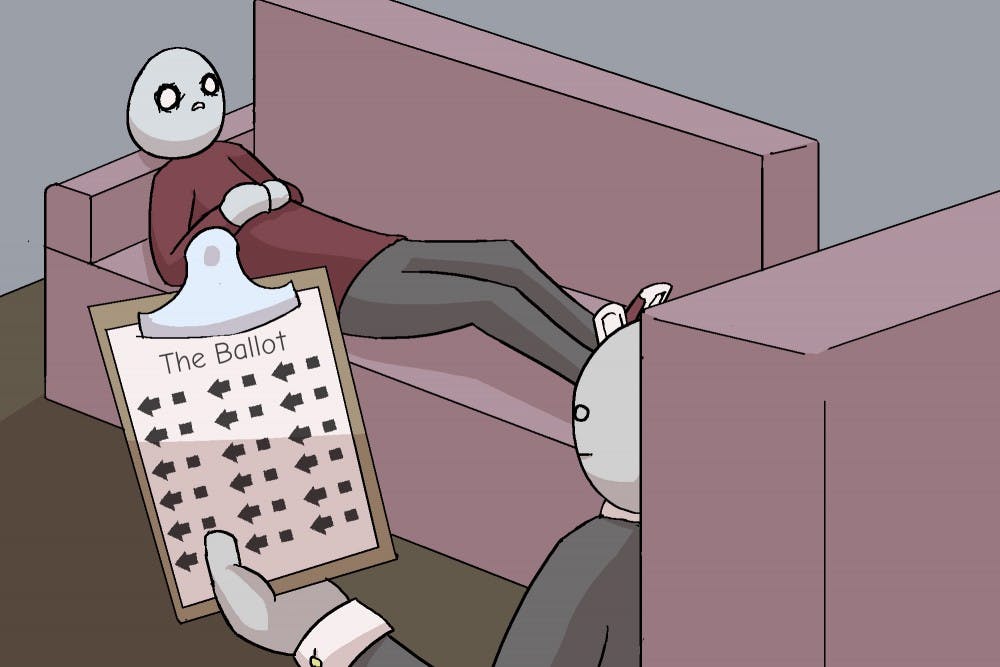Conflict is a natural product of any election; clashing opinions and the bias of the media leave voters feeling panicked and overwhelmed. This year’s election, in particular, has stirred up a great deal of controversy, which is due in part to the wide divide between Trump supporters and Clinton supporters.
Specifically, the focus on mudslinging and the inescapable social media coverage of the election have contributed to this stress.
These emotions have evolved into something greater: election anxiety, a condition voters are beginning to seek legitimate psychological help for.
According to a Harris Poll survey, about 52 percent of U.S. adults are experiencing high levels of stress linked to the presidential election. Psychologists have noted this, claiming that many of their patients are attributing their stress to the events surrounding the election.
Despite what most would think, this election has affected each party equally, with 55 percent of Democrats and 59 percent of Republicans finding the election to be a “major source of stress.”
Groups that are particularly stressed by this election include seniors (over 71 years old), in which six out of 10 claim to be stressed about the election, and young adults.
“We can only guess as to the reasons older adults might be more likely to report election stress — one possibility is that they are concerned about the future for their children and grandchildren,” Vaile Wright, member of the American Psychologist’s Association’s Stress in America Team, said to the Washington Post.
It is important to note that this election is different from others. This feeling of being overwhelmed is due to the anomalies occurring in this election.
For example, according to the New York Times, psychologists have attributed a feeling of distrust in their patients specifically linked to issues dealing with secrecy such as Clinton’s email scandal and Trump’s refusal to release tax returns.
To cope with this issue, the APA has outlined ways to alleviate election-related stress, either through avoidance methods or methods that require voters to face the challenge head on.
For example, it urges voters to take breaks from the media or limit social media usage. This is particularly important because the media has evolved to include the opinions of the voters; there is no longer a straightforward account of debates or campaigning events. You are sure to find a heated argument at every tweet, comment section or Facebook post in sight.
Perhaps, the use of social media has blurred the lines between biased and unbiased sources floating around the media. It has become extremely difficult to find sources that simply state facts about the candidates and their policies. One can’t help but feel like others’ opinions are being shoved down their throat at every turn.
"There aren't easily found unbiased accounts and the media often prefers sensationalism and horserace journalism to issues," David Wells, political science professor at ASU, said. "And the larger media doesn't cover some races hardly at all."
To avoid this, it is important to find unbiased accounts of the presidential race.
Similarly, APA suggests that voters avoid having heated discussions about the presidential candidates. This is pertinent because heated arguments often accomplish nothing and only leave the participants even more invested in their opinion than before.
The APA also suggests exercising the right to vote. This gives voters the power to contribute in a way they find beneficial to the welfare of the country. To further this idea, it urges voters to get out there and become active members of the voting community, participating in campaign events promoting their preferred candidate. This would give voters a sense of control.
Whichever way it is approached, the fact of the matter is that this election has stirred up conflict, but that does not mean voters should give in to the stress. Rather, they should steer clear of resources that focus on opposition and inform themselves instead.
"I think the abundance of information that's available 24/7 is overwhelming. Both candidates are using social media platforms and citizens are more connected than ever before," Gregory Haft, ASU public health graduate student, said. "When tuning out becomes more difficult than tuning in, anxiety will naturally follow."
Reach the columnist at ghirneis@asu.edu or follow @ghirneise2 on Twitter.
Editor’s note: The opinions presented in this column are the author’s and do not imply any endorsement from The State Press or its editors.
Want to join the conversation? Send an email to opiniondesk.statepress@gmail.com. Keep letters under 300 words and be sure to include your university affiliation. Anonymity will not be granted.
Like The State Press on Facebook and follow @statepress on Twitter.




